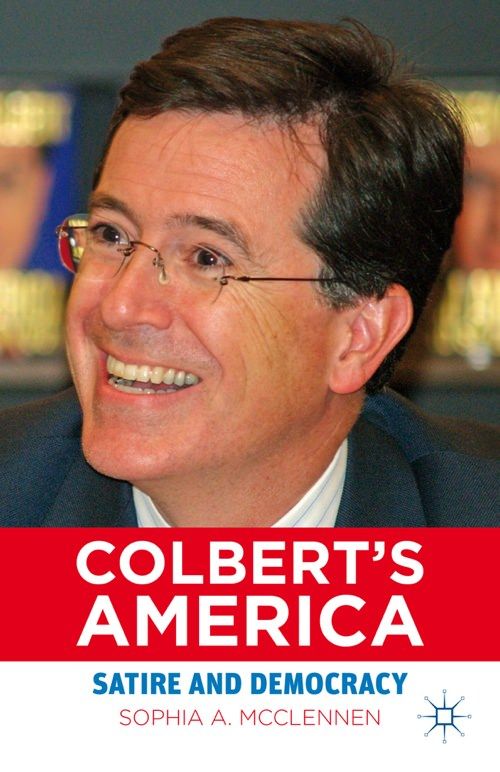
In 2005, comedian Stephen Colbert left the cast of The Daily Show for his own show, The Colbert Report, which has since become famous for satirizing personality-driven political shows like The O’Reilly Factor and Hannity. Since the show’s first episode, Colbert’s program has entertained its audience, encouraged political discourse, and stirred some of the most complacent members of society.
In her new book Colbert’s America: Satire and Democracy, Penn State professor, Sophia A. McClennen, examines how the comedy of Stephen Colbert packs enough political punch to change the way a nation thinks. The first book to cover the various themes and features of Colbert’s satire, Colbert’s America gives readers insight into the powerful ways that Colbert’s comedy challenges the cult of ignorance that has been threatening meaningful public debate since 9/11.
McClennen suggests that Colbert does more than mock pundits and politicians: he actually has helped influence a new generation of actively involved citizens. As Colbert’s America explains, satire offers the public a medium through which to express resistance to reigning political policies and social attitudes. But Colbert’s satire goes even further, offering viewers myriad ways to engage with society.
Colbert’s America also claims that the ability to speak truth to power through parody or mockery is at the heart of political satire. McClennen suggests, for instance, that Colbert’s performance at the 2006 White House Correspondents’ Dinner, when he mocked the President to his face, was a watershed moment—for Colbert’s career, for the Bush presidency, and for highlighting a new era in media. Some of these same innovations can be seen in his recent engagement with the 2012 elections.
McClennen’s book makes a number of key arguments:
- Colbert’s show has blurred the lines between parodying the news and creating the news, between mocking politics and participating in it, between having fun and making a difference.
- By combining comedy with biting social critique Colbert’s satire has redefined what it means to be a public intellectual.
- Colbert’s show both entertains and educates at the same time.
- Colbert’s in-character persona offers an especially complex version of satire—one which depends on the critical thinking abilities of his audience.
- Colbert is part of a long legacy of US satirists that used parody to advocate for democracy.
- Interactive media, including blogs, podcasts, and videos have emerged as powerful tools that help spread Colbert’s message.
- Colbert ushered in a new age in media, attracting youth culture to politics, economy, and social issues in unprecedented droves.
Despite these potential pitfalls to his form of satire, McClennen argues that ultimately Colbert’s show offers his audience a way to “amuse itself to activism.” Against claims that suggest that satire encourages cynicism, apathy, or disrespect for democracy, Colbert’s America argues that Colbert’s satire is a powerful tool for fostering civic engagement.
McClennen writes, “Watch Colbert. Night after night, he does a show where he has a bunch of fun and raises viewer awareness of a range of major social issues. Even more, he lets his viewers in on the fun. What they do after they turn off their televisions is up to them.”
“America According to Colbert demonstrates that Colbert’s work is also a form of public education, teaching his audiences to be distrustful of power and fools, and to view all politicians, pundits, and politics itself with mistrust. McClennen’s well-written and documented study brilliantly illuminates the Colbert phenomenon and its importance for contemporary politics, journalism, and popular culture today.”— Douglas Kellner, Professor, UCLA; author of Guys and Guns Amok and Media Spectacle and the Crisis of Democracy
“Colbert’s America is beautifully readable and delightfully smart; rich in examples and conceptual frame. McClennen gives us a master class in the critical pedagogy of Colbert.”— Geoffrey Baym, Associate Professor, Department of Media Studies, University of North Carolina Greensboro
“An always insightful and often delightful reading of the most sustained and successful exercise in political satire in modern American life. Stephen Colbert would no doubt agree – well, about all but the ‘satire’ part. Let the eagle soar!”— Geoffrey Nunberg, Adjunct Full Professor, School of Information, University of California at Berkeley